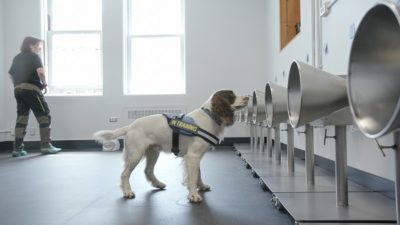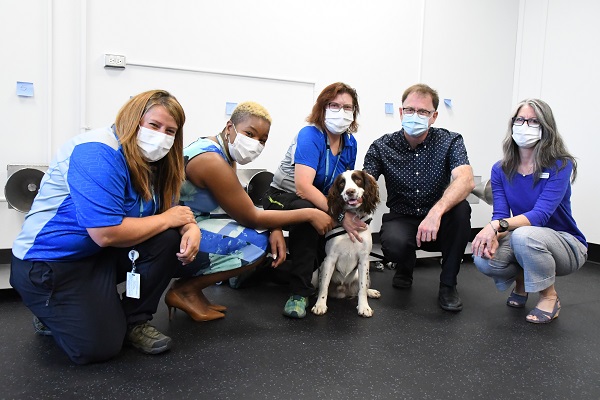By Rachel Galligan
For more than five years, Vancouver Coastal Health’s (VCH) canine scent detection team – Canines for Care – has been sniffing out Clostridioides difficile (C. difficile) in healthcare settings both in British Columbia and across the country, reducing infection rates and improving patient quality of care. Now the team has added COVID-19 to their scent detection roster.
“We wanted to tackle COVID-19 infection prevention from every possible angle,” says Allison Muniak, Executive Director of Quality and Patient Safety, Infection Prevention and Control and Risk Management at VCH. “We are uniquely positioned to do this work with a successful C. difficile detection program led by a multi-disciplinary team of medical professionals, dog handlers and infection prevention practitioners. It was a natural evolution to build on our strengths and find a comprehensive, non-invasive approach to detecting the virus and supporting healthy communities as we work to put the pandemic behind us.”
Health Canada is providing funding to VCH as part of the Safe Restart Agreement Contribution Program, which seeks to assist in the safe restart of Canada’s economy and make the country more resilient to possible future surges of COVID-19. VCH’s ongoing research project aims to explore the signature scent of COVID-19, and develop a dog training program to provide ongoing public health support. Possible applications of COVID-19 canine scent detection includes screening in airports, on cruise ships and at public events.
“The ability of the healthcare workers, researchers, dog handlers, and three talented dogs at Vancouver Coastal Health to develop a new virus scent detection program from scratch is an enormous accomplishment,” says Adrian Dix, Minister of Health. “This is one of the countless examples of the way people in our health care system have stepped up to support all of us in a time of great need, keeping us safer and more protected from COVID-19.”
Even with an experienced team, training dogs to detect a relatively new virus is no small feat. The Canines for Care team started from scratch six months ago. Initially, they identified “green” dogs for training and welcomed two Labrador retrievers, Micro and Yoki, and one English springer spaniel, Finn, to the pack.
“Every dog can sniff but not every dog can work,” says Teresa Zurberg, Canine Scent Detection Specialist and nationally-recognized canine handler. “We worked with scent detection teams around the world to find dogs that have the right combination of genetics and also the potential to do this work.”
They then developed a methodology to access appropriate COVID-19 samples and conduct training in a way that’s safe for the dogs and their handlers.
“Working closely with the clinical teams, we have been able to collect COVID-19 saliva, breath and sweat samples from consenting patients across the diverse demographics found in our health region,” says Dr. Marthe Charles, Head of Division of Medical Microbiology and Infection Prevention and Control at VCH. “Access to this array of samples has allowed for robust scent detection training. The scent samples are prepared in a way that removes the risk of transmission of active virus, protecting our team.”

“The fact that we’re seeing such strong results speaks to the rigor of our training program. These findings are superior to certain antigen tests available on the market,” added Dr. Charles. “We’re very pleased with the results so far and are excited to continue this work.”
With more than 300 million olfactory receptors, dogs are known to be able to detect unseen threats to human health, including bacterial and viral infections and cancer, and that their accuracy can be comparable to certain laboratory diagnostic tests.
VCH was the first healthcare organization in the world to operationalize its C. difficile detecting canine program that helps detect and reduce cases of C. difficile in the healthcare environment. Since 2016, the canine scent detection teams at VCH have searched hundreds of hospital areas for C. difficile. They’ve also visited 32 Canadian health care facilities to share their infection prevention expertise.
Canines for Care is generously supported by the VGH & UBC Hospital Foundation with special thanks to the Rix Family Foundation and Peterson, and Health Canada. Learn more about the program at www.vch.ca/caninesforcare.
Vancouver Coastal Health (VCH) is responsible for the delivery of $4.1 billion in community, hospital and long-term care to more than one million people in communities including Richmond, Vancouver, the North Shore, Sunshine Coast, Sea to Sky corridor, Powell River, Bella Bella and Bella Coola. VCH also provides specialized care and services for people throughout B.C., and is the province’s hub of health-care education and research.
Rachel Galligan is Communications Leader, Public Health, Vancouver Coastal Health.




